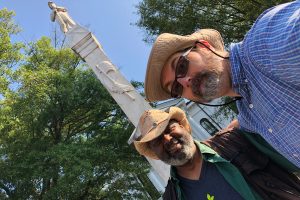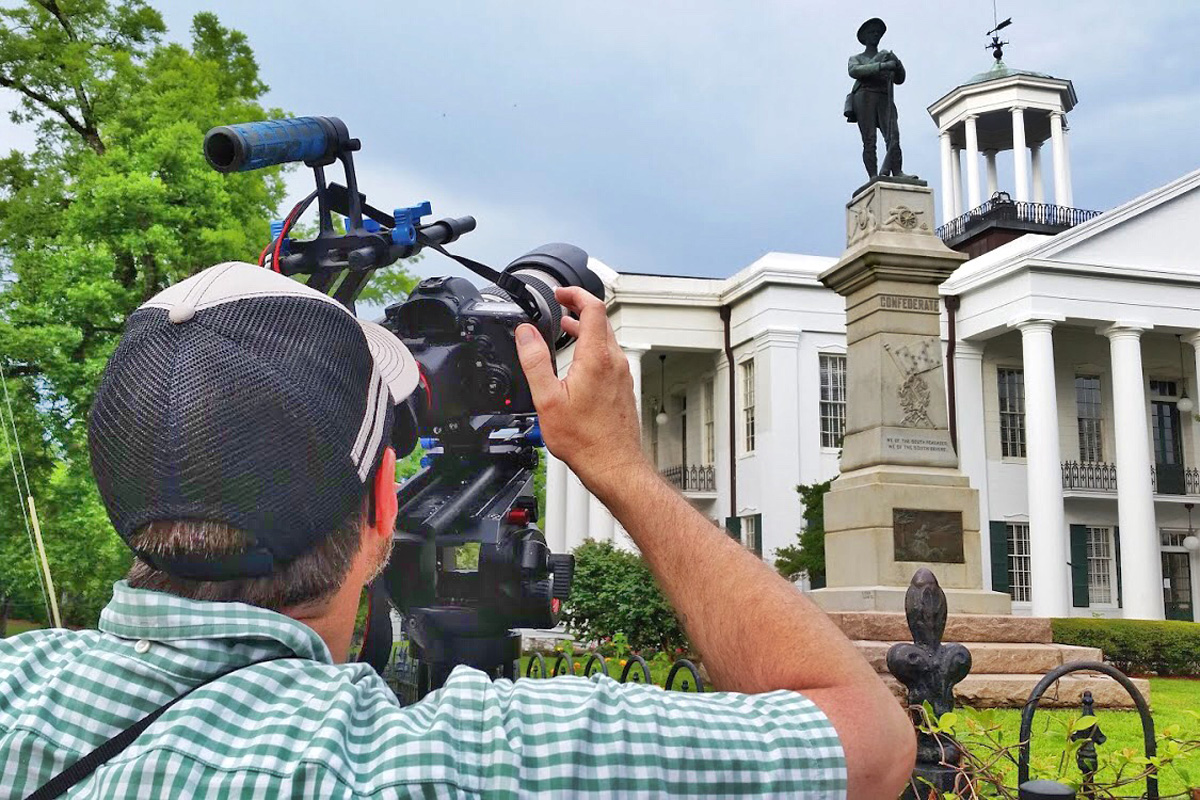After growing up in a southern family steeped in the lie of the romanticized “lost cause,” I’ve spent most of my adult life trying to unpack and reconcile what I was taught in contrast to the truth as I continue to learn it.
The seed of the idea for my documentary, “Dear Johnny Reb: An Argument for the Removal of Confederate Memorials,” came from a scene I’d written for another film project in which a character talks to a Confederate “sentinel” monument asking, “Hey Johnny! You won, yet?”

That led to me asking questions like; Who put these here? When? Who paid for them? Where did they come from? Who made them? How many are there? Where? Why were most of them erected around the 1910s? Why are so many on courthouse grounds?
So I started looking to find out.
Early on in my research, after I had located all the “sentinel” memorials in the state, I talked to my friend Donna Ladd (who is the co-founder of the Mississippi Free Press). We’d had numerous conversations over the years about the Confederacy, the “lost cause,” racism and the role white people need to play in it all. I asked her opinion on whether I should go ahead with this film because I wasn’t sure it was my place to do it, to which she said, “It’s absolutely your place to do this.”
That included more than a dozen trips to the Mississippi Civil Rights Museum with its sobering narrative of our state’s past (as part of my research for another film). That helped me formulate a “case” against any memorialization of the Confederacy and the lost-cause narrative that I and so many white southerners were taught.
‘A Letter from the People of Mississippi’
After a lot of research, I composed a letter to these Confederate “sentinels,” informing them of the good news that the war was over, and they could stand down and go home.
My film is a literal letter to these ghosts of the Confederacy, but it’s also a letter to the ghosts of my ancestors (being the descendant of at least four confederate soldiers) and their ideals that are still baked into my own DNA, and you could say a letter to inherited racism in general. And it’s a literal argument for their removal. I tried my best to craft an ironclad, inarguable case.

To be blunt, there is absolutely, positively nothing about the Confederacy worth memorializing or celebrating. Zero.
Why would we do that? It’s really, really dumb and backwards and as long as we continue to do so, the rest of the world will continue to think Mississippi is racist, backwards and stuck in the past.
Originally the film was just going to consist of me reading the letter to 43 sentinels in the state, but then a close friend suggested I turn it in “a letter from the people of Mississippi.” So I slowly recruited friends, friends of friends, family of friends, and friends of friends of friends who agreed with the premise of the film to appear on camera. Everyone had to be a Mississippi resident. I tried my best to make the demographics of the film align with the demographics of the state.
There were more people who agreed with me but said they couldn’t be in the film than folks who agreed with me and wanted to be on camera.
Filming took place between May 2018 and December 2018; post production was finished in May 2019. Mississippi musician Cole Furlow composed, recorded and engineered the music, with violinist Vince Massimino, the assistant concertmaster of the Mississippi Symphony Orchestra. The film is now making the rounds on the national film circuit and has won several awards.
Needed: Memorials to Mississippi’s Enslaved and Indigenous People
I personally believe these symbols do not, or at least should not, represent 21st-century Mississippi, which calls itself the “Hospitality State” with the largest portion of African Americans of any U.S. state. I believe we’re better than that. Maybe I’m naive. But if we do not remove Confederate monuments from public grounds—which we should do, particularly courthouse lawns—we need to at least add context to them.

My other primary goal is to help build awareness about the lack of memorials to the history of enslaved peoples and indigenous people of our state. We need more memorials to them, and fewer or, better yet, no memorials to the Confederate States of America.
To my knowledge and research, there are virtually no real memorials to the enslaved people of Mississippi and their descendants. If there are, they certainly are not so lovingly revered and protected as the more 150 (I stopped counting after 150) Confederate “memorials” in Mississippi.
Not to mention, with the Mississippi Department of Archives’ help, I could not find any memorials to the indigenous peoples of Mississippi. This needs to change.
Change, in fact, is the point of my film: to hopefully enlighten people to these ideas, to spark empathy in the minds of people who would normally never be open to the idea of challenging the narrative these statues represent and to hopefully enlighten them to the real reason these “memorials” were put there.
Watch my documentary below.
This MFP Voices essay does not necessarily represent the views of the Mississippi Free Press, its staff or board members. To submit an essay for the MFP Voices section, send up to 1,200 words and factcheck information to donna@mississippifreepress.com. We welcome a wide variety of viewpoints.






